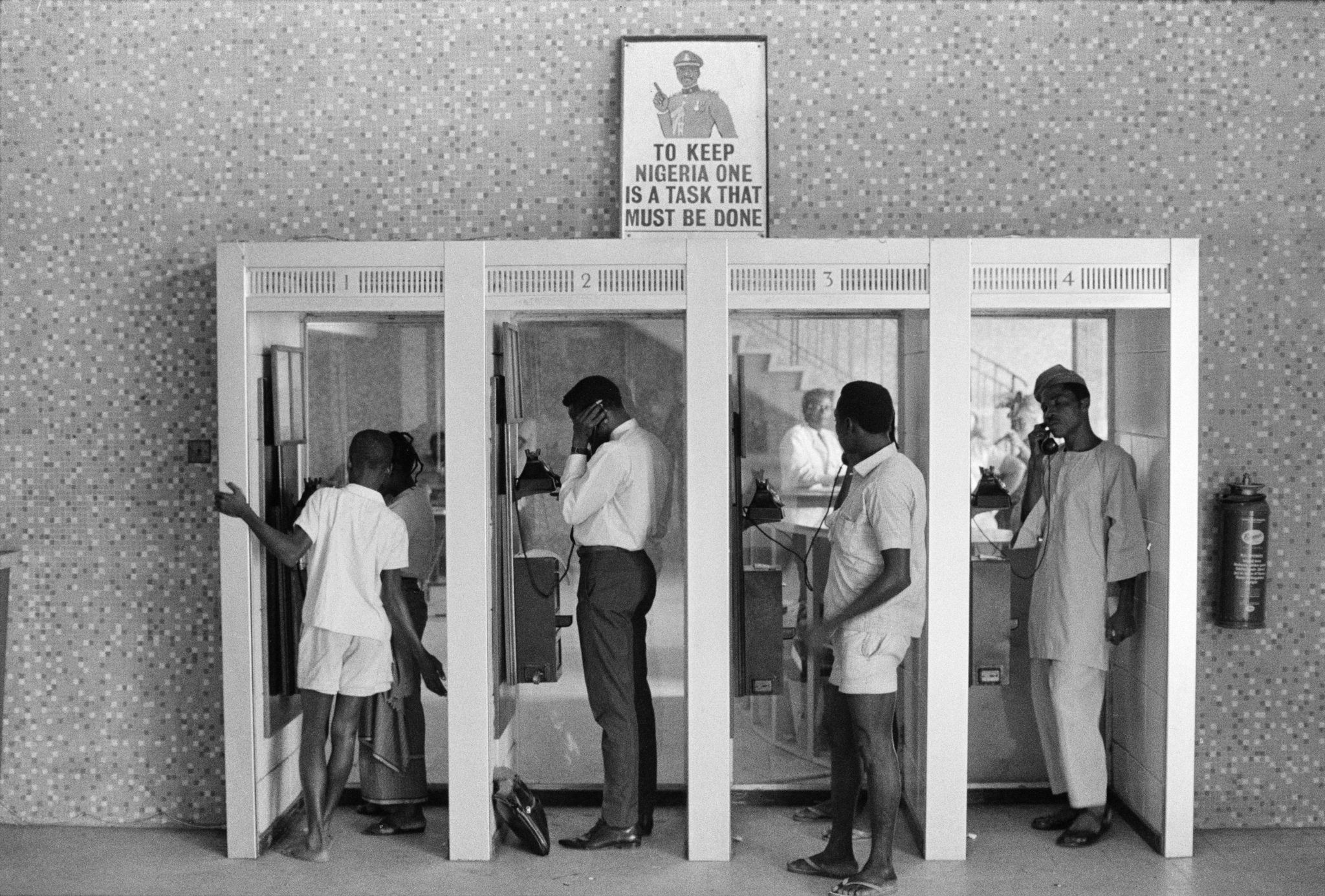It’s not obviously a war photograph, but for Emmanuel Iduma it recalls the calm amid the chaos of a country coming apart
Every so often I return with frenzy to the photographs Bruno Barbey took in Nigeria during the country’s 30-month civil war, lasting between 1967 and 1970. And I return as though to create a frame-by-frame account of the conditions of despair during years that are the most documented in Nigerian history. In addition to French-born Barbey, a few dozen other foreign photographers had descended on the scene of the conflict, and the atrocities they pictured spawned sufficient international outrage that a student at Columbia University self-immolated in protest. Barbey was embedded with the Nigerian Army, and yet he is, in my viewing and thinking, drawn less to the crescendos of the conflict itself, and more to the dirge-like traces left in its wake. Hence this photograph, taken in Lagos, roughly 60 kilometres from the closest battlefield.
The clean demarcations of the telephone booths, in which each speaker is isolated – focused entirely on their private intrigues – seem to me a quiet dirge, the echo of a faraway cry. I can imagine a relative on the other end of the line, who’s perhaps travelled kilometres to find a working telephone; who had been informed of the timing of their telephonic rendezvous in a letter that took weeks to arrive; so that the woman and child you see have gone to the booth at the same time hoping someone will pick up. And the boy – in the slant of his pose, his open right palm broadened into a why – tells of a reconciliation taking longer than he’d imagined.
It remains a fact, however, that the photographs taken during the Nigerian Civil War, those accessible through a Google search, are almost in every case attributable to a non-Nigerian photographer. What to make of this? What to make of the systems of preservation – of an agency like Magnum, for instance – that allow for a foreigner’s photograph of an event to outlive a local’s? I think, for instance, of Peter Obe, a famed Nigerian photojournalist of that era, whose photographs of the Nigerian Army I have seen referred to in accounts of the war but are not referenceable, as far as I know, in any digital archive. Yet I am not overburdened by the question of how I am granted access to history: I claim Barbey’s photograph as I would Obe’s. It is an entitlement born of the degree of affinity I feel to the war, a cataclysm that resulted in the disappearance of one of my uncles.
Barbey’s photograph is most accomplished when I consider its composition. He must have stepped back to get all four booths in the frame, at a moment when each was occupied. If there was a line of people in his peripheral vision, he deemed anyone on either side of the booths superfluous, focusing instead on a dramatis personae made up of telephone users as diverse in idiosyncrasy as in the range of their conversations. The panache of each person: consider as an example the hand cupped over an ear by the man whose briefcase rests on the floor, who stands sharp and rigid as a recruit. These roles would otherwise be mundane if this weren’t, obliquely at the very least, a wartime photograph, a literal connotation of the spread of country united by telephone. (To keep Nigeria one is a task that must be done, reads the sign perched atop the booth – the slogan used by the Nigerian government to galvanise its soldiers, the thrust of its propaganda, and words still invoked in conversations around ‘national unity’ in Nigeria today.) As a wartime photograph taken in an unaffected Nigerian city, it indicates a contraposition of normalcy against chaos, and tells of what cannot be imagined in Lagos by those who are outside the thickets of misery, the pace of their lives uninterrupted.
But when I first saw the people in the photograph, particularly the boy and woman in the leftmost booth, I made a connection to an occasion other than war. During my childhood, my father lived abroad for four years. My brother and I would sometimes be taken to a neighbour’s house to speak with him over the phone. Three decades later, I still recall the emotional distance my father and I tried to bridge during those calls: the nervous flush in my heart as I tried and failed not to stutter, as though drawing from a muddy cistern, and the eagerness in his own voice, a father who understood the limits of my communication, compressing his vocabulary into monosyllables of affection.
